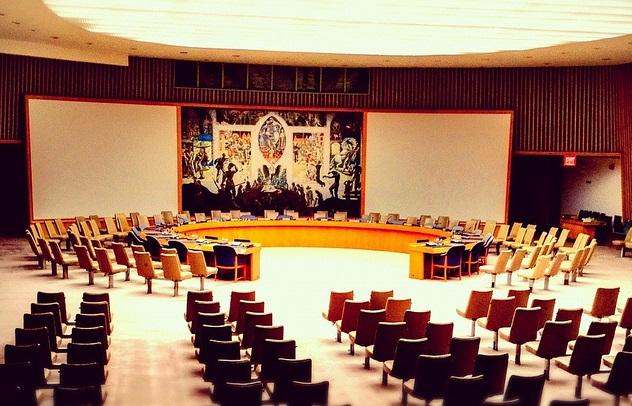United Nations highlights the need for clear approaches to radicalisation
Posted By Tobias Feakin on September 30, 2014 @ 14:30
 [1]The United Nations Security Council unanimously voted 15-0 last week to adopt Resolution 2178 on Foreign Terrorist Fighters [2] (FTFs). While Obama’s accompanying speech promised that the US and allied partners would dismantle and then destroy the ‘network of death’ that is ISIS, it’s the content of the resolution that’s more surprising. It places direct responsibility upon states to stem the flow of FTF’s into Syria and Iraq, and for the first time, the Council underscores that Countering Violent Extremism (CVE) is an essential element of an effective response.
[1]The United Nations Security Council unanimously voted 15-0 last week to adopt Resolution 2178 on Foreign Terrorist Fighters [2] (FTFs). While Obama’s accompanying speech promised that the US and allied partners would dismantle and then destroy the ‘network of death’ that is ISIS, it’s the content of the resolution that’s more surprising. It places direct responsibility upon states to stem the flow of FTF’s into Syria and Iraq, and for the first time, the Council underscores that Countering Violent Extremism (CVE) is an essential element of an effective response.
The resolution defines FTFs as individuals who travel to a state other than their states of residence or nationality for the purpose of ‘perpetration, planning, or preparation of, or participation in, terrorist acts or the providing or receiving of terrorist training’ and made specific reference to concerns over those individuals who had joined the Islamic State in Iraq and the Levant (ISIL), al-Nusra Front and other groups in some way connected to al-Qaeda. Under the resolution, countries have to ‘prevent and supress recruiting, organising, transporting, and equipping of FTFs, and the financing of FTF travel and activities’, and must have laws which allow for the prosecution of those departing their nations for terrorist related purposes.
This comes at a time when the Australian Parliament is debating its own legislative changes [3] to address the foreign-fighter issue, with one of the most contentious elements being the move to make it an offence to travel to or remain in a ‘declared area’ designated as being of ‘terrorist activity’ without a valid reason. Some have argued that constitutes a reversal of the onus of proof [4] and clarity will certainly need to be provided in the weeks ahead to allay the fears of the broader public. However, Resolution 2178 demonstrates that UN thinking largely parallels the Australian government’s in terms of countering FTFs. There was a careful caveat in the wording that Member States must comply with their human rights obligations when fighting terrorism and a note that a failure to do so contributes to radicalisation. The resolution thus recognises that ‘fighting evil with evil’ plays into the hands of terrorist groups.
Whilst that element of the resolution was in step with Australian policymaking, there were areas of disconnect, where Australia could do more. The fact that CVE was mentioned as ‘essential’ in responding to this issue was a first for the UN. The document underlined the importance of engaging relevant local communities, empowering concerned groups of civil society and tailoring approaches to countering recruitment, and that’s an area where Australia could focus more. Yes, the legislative tools are important to empower our security apparatus to counter the threat and stem the flow of potential fighters into theatre, but tackling the ‘softer’ approaches to diverting people away from that course of action is more problematic, often difficult to measure and causes controversy of its own. Done well, this can create better linkages and partnerships between government and communities, helping build trust; delivered poorly it can have the opposite impact. Australia has worked hard in that area, funding many community projects, but more projects looking to develop effective intervention strategies in partnership with other statutory partners, to divert young people away from those groups would be a wise move.
The other area that the UN highlighted was the use of the ‘internet to incite others to commit terrorist acts’, and the need to ‘prevent terrorists from exploiting technology to incite support for terrorist acts’. Currently Australia, along with the other nations present at the UN, find themselves in the midst of an ‘online jihad 3.0’ [5] (PDF) and are playing a slow catch-up game in relation to ISIS’s radicalisation narrative. Australia needs to think about how to combat the online narrative within its counter-terrorism approach.
So far the security apparatus in Australia has succeeded in interdicting potential terrorist plots, and clearly the cooperative counter-terrorism teams are working well at joining up federal and state police alongside ASIO. But the threat is morphing and changing from that faced only a few years ago. It would be a good time to re-visit the 2012 Australian Counter Terrorism Plan [6] and ensure that it adequately addresses the changing threat environment, and puts an appropriate focus on CVE and the online environment.
Tobias Feakin [7] is a senior analyst at ASPI and director of ASPI’s International Cyber Policy Centre [8]. Edited image courtesy of Flickr user Jason Paris [9].
Article printed from The Strategist: https://aspistrategist.ru
URL to article: /united-nations-highlights-the-need-for-clear-approaches-to-radicalisation/
URLs in this post:
[1] Image: https://aspistrategist.ru/wp-content/uploads/2014/09/7358537044_0c360e9ce2_z.jpg
[2] Resolution 2178 on Foreign Terrorist Fighters: http://usun.state.gov/briefing/statements/232071.htm
[3] its own legislative changes: http://www.abc.net.au/news/2014-09-22/new-anti-terrorism-laws-explained/5761516
[4] onus of proof: http://www.smh.com.au/comment/smh-editorial/abbott-strikes-right-balance-in-counterterrorism-speech-20140922-10k7p4.html
[5] online jihad 3.0’: https://www.aspistrategist.ru/publications/opinion-pieces/savvy-jihadists-launch-jihad-3.0/Savvy-Islamists-launch-jihad-3.0.pdf
[6] Australian Counter Terrorism Plan: http://www.nationalsecurity.gov.au/Mediaandpublications/Publications/Documents/national-counter-terrorism-plan-2012.pdf
[7] Tobias Feakin: https://www.aspistrategist.ru/about-aspi/aspi-staff/senior-analysts/tobias-feakin
[8] International Cyber Policy Centre: http://cyberpolicy.aspistrategist.ru/
[9] Jason Paris: https://www.flickr.com/photos/jasonparis/7358537044
Click here to print.